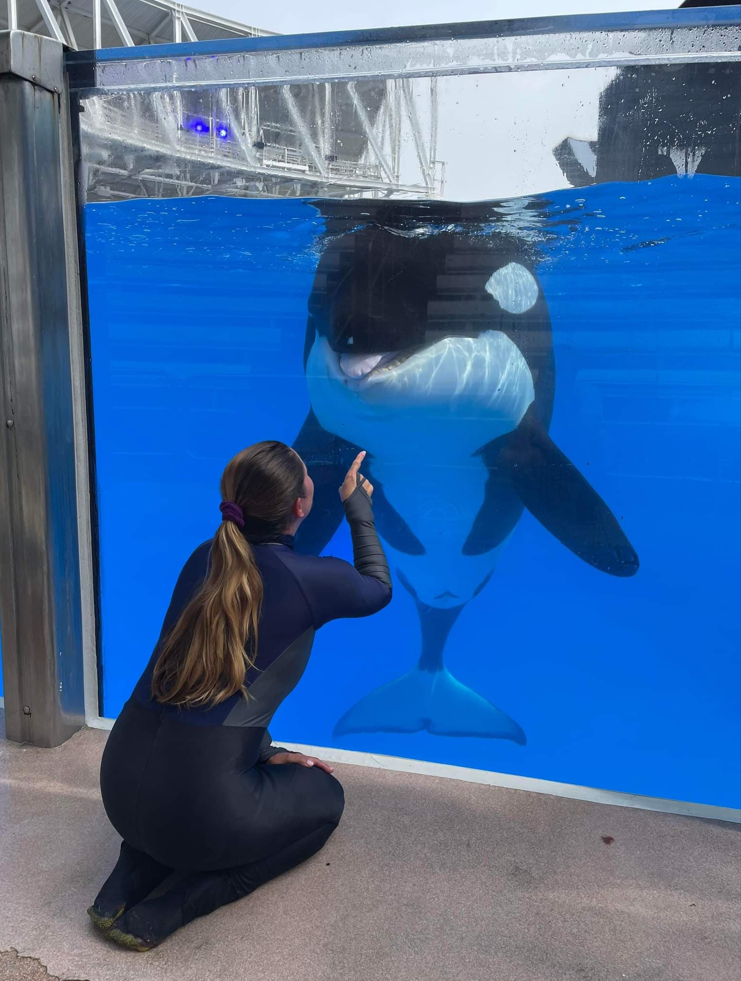
What can we learn from the work of whale and dolphin trainers? In recent years, marine parks like SeaWorld have become controversial for keeping marine mammals in captivity. Even so, more than 180 million people visit zoos, aquariums, and marine parks every year in the U.S. alone. At SeaWorld, the killer whale show still fills up the stadium. It seems that beyond the surface-level opposition, we are still drawn magnetically to the domesticated wild animal. It huts something deeper about our human experience, to see life that's different than our own.
In this book, I'm taking another look at the lives of whales and other animals in human care. In doing so, I hope to assemble a new perspective on the human-animal relationship—one that is less romantic of subjects like "freedom" and "emotional experience" and more accepting of different lived experiences throughout the animal kingdom.
Through heavy archival research, cutting-edge scientific research, and exclusive interviews, we will look at the stories of exotic animal trainers, scientists, and activists. I will present the story as a mix of academic analysis, personal narrative, and oral history. This is a very long-term project. Publication date not set.
Frequently Asked Questions
Below are some of the things I get asked quite often when I approach people for an interview.
What are you looking for?
As an oral historian, I interview people for their life stories, not for their opinions. I'm looking for stories that illuminate the human-animal connection. This can come from an animal trainer, an aquarium guest, a hunter, a scientist, an activist, and others. Although I believe in meaningful animal stories, I am mostly interested in the human experience of the animal, not the animal's own natural history or any speculations of its inner life and experiences.
Who have you talked to?
Because of my work at the International Marine Animal Trainer's Association (IMATA), affiliation with the Navy Marine Mammal Program, and some animal advocacy projects, I am acquainted with a generous handful of current/former marine mammal trainers at all three SeaWorld parks, Miami Seaquarium, Loro Parque, Marineland Antibes, and others. Many of these people have agreed to contribute their oral history to this project. These people are first and foremost my friends and I seek to tell their story with compassion. I owe some of these connections to the Dawn Brancheau Foundation and one of Dawn's sisters, who has so kindly supported me throughout this process.
To maintain a nuanced perspective, I have also interviewed some marine biologists and scientists with an anti-captivity perspective. I attended Superpod8 in the summer of 2023, a convention that focuses on anti-captivity advocacy. In addition to providing the needed nuance, these opposition perspectives provided an interrogative force that helped shine a brighter light on how we should treat animals.
What are you writing?
Although my eventual goal is a nonfiction book, I plan to write shorter articles and produce podcasts featuring the unique oral history I discover. I hope to broaden each story with archival content, academic analysis, and also deeply personal stories from my own life. I hope that I can feature some of these shorter pieces soon.
What are your qualifications?
Thanks to a wonderful collection of mentors and my senior producer experience at the Stanford Storytelling Project, I've been trained on the craft of interviewing and story creation. For my creative writing minor, I've also been through many workshop classes that teach the art of writing. But most importantly, I am willing to listen, and to empathize.
I also have direct experience working with dolphins and sea lions in the Navy Marine Mammal Program. I can't talk or write about this experience publically, but it has given me a far better feeling for what the field is like, a feeling that I can transfer into my work. It has also given me many connections to people who may be willing to share their story.
Finally, I have a strong technical background, which has helped me understand some of the research done on animal cognition and behavior. The framework of behavior has many connections to my main research in robotics, which means that I will be able to talk about animal training in ways that go beyond the superficial overviews often found in some other works.